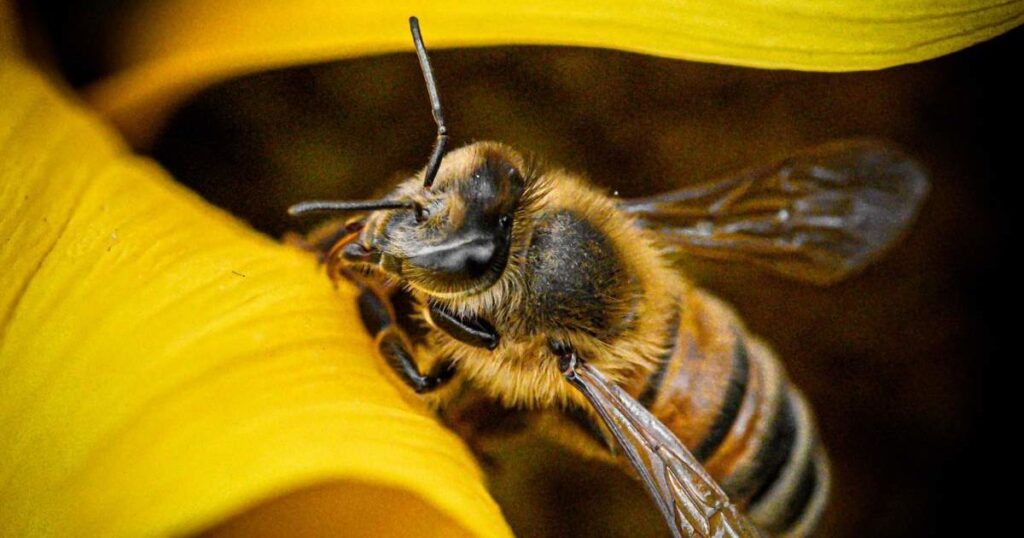
Bees are often seen as a nuisance when they buzz too close to our homes or gardens, but these small pollinators play a crucial role in maintaining the balance of our ecosystems. While it’s natural to want to keep bees from nesting in inconvenient or dangerous places, it’s equally important to ensure we’re protecting these vital creatures. So, why are bees important, and how can you manage them responsibly without causing harm? Let’s explore.
1. Why Are Bees So Important
Bees aren’t just another insect—they’re essential to both the environment and human life. Here’s why:
- Pollination Powerhouses: Bees are responsible for pollinating around 75% of flowering plants and about 35% of the world’s food crops. Without bees, many of the fruits, vegetables, and nuts we rely on would become scarce.
- Biodiversity Boosters: Bees help maintain the health of ecosystems by supporting plant growth, which provides food and habitat for countless other species.
- Economic Contributors: The agricultural industry depends heavily on bees for crop production. In fact, bee pollination contributes billions of dollars to the global economy each year.
- Natural Beauty: Beyond their economic and ecological benefits, bees contribute to the beauty of our natural landscapes by helping flowers bloom and gardens thrive.
2. The Decline of Bee Populations: Why It Matters
In recent years, bee populations have been declining due to a combination of factors:
- Pesticide Use: Chemicals used in farming and pest control can harm bees directly or disrupt their natural behaviors.
- Habitat Loss: Urbanization and deforestation reduce the natural habitats where bees build hives and find food.
- Climate Change: Shifting weather patterns affect the availability of flowers and nesting sites, making it harder for bees to thrive.
- Diseases and Parasites: Pests like the Varroa mite weaken bee colonies and contribute to their decline.
This decline isn’t just bad news for bees—it affects food security, biodiversity, and the overall health of our planet.
3. When Do Bees Become a Problem?
While bees are generally beneficial, there are situations where their presence can pose risks:
- Hives Near High-Traffic Areas: Bees nesting near doorways, playgrounds, or patios increase the risk of accidental stings.
- People with Allergies: For individuals allergic to bee stings, even a single sting can trigger a life-threatening reaction called anaphylaxis.
- Indoor Infestations: Bees that build hives inside walls, attics, or chimneys can cause structural damage and create a mess with honey and wax.
In these cases, it’s important to manage the situation carefully to protect both people and the bees.
4. How to Protect Bees While Managing Pests
If you need to manage bees on your property, there are safe, humane ways to do it without harming these important pollinators.
- Avoid Chemical Pesticides: Many pesticides are toxic to bees, even when they’re not the intended target. Opt for bee-safe pest control methods and avoid spraying near flowering plants.
- Call a Professional Bee Removal Service: If you find a hive in an inconvenient or dangerous spot, contact a licensed pest management professional who specializes in humane bee relocation. Many beekeepers and pest control companies can safely move the hive to a better location where the bees can continue to thrive.
- Relocate, Don’t Exterminate: Unlike wasps or hornets, bees should never be exterminated. They can be safely relocated to farms, gardens, or wild areas where they can continue their important work.
- Seal Potential Entry Points: After safely removing a hive, seal cracks, holes, or gaps in your home’s siding, roof, or walls to prevent bees from returning.
- Plant Bee-Friendly Gardens Away from High-Traffic Areas: If you love having bees around but want to avoid conflicts, create a bee-friendly garden in a low-traffic area of your yard. Plant native flowers, wildflowers, and pollinator-friendly plants to attract bees away from living spaces.
5. Simple Steps to Make Your Property Less Attractive to Bees
If you’d prefer to prevent bees from nesting near your home in the first place, here are some eco-friendly strategies:
- Cover Food and Drinks Outdoors: Bees are attracted to sweet foods and beverages, so keep these covered when dining outside.
- Keep Trash Bins Sealed: Bees may be drawn to sugary residues in garbage, so ensure bins are tightly closed.
- Reduce Standing Water: Bees, like many insects, are attracted to water sources. Remove standing water around your property to reduce attractants.
- Use Natural Repellents: Scents like cucumber peels, citronella, or peppermint can deter bees from certain areas without harming them.
6. What to Do If You Encounter a Bee Swarm
Swarming is a natural part of a bee colony’s life cycle, typically happening when bees are searching for a new place to build a hive. Swarms may look intimidating, but they are usually not aggressive because the bees are focused on finding a new home.
Here’s what to do if you encounter a swarm:
- Stay Calm and Keep Your Distance: Bees are unlikely to sting unless provoked. Avoid making loud noises or sudden movements.
- Don’t Attempt to Remove Them Yourself: Swarms should be handled by professionals who can safely relocate the bees.
- Call a Beekeeper or Pest Control Professional: Many beekeepers are happy to collect swarms for free, while pest management companies can ensure the bees are moved safely.
7. Why Supporting Bees Is Good for You and the Planet
Protecting bees isn’t just about helping the environment—it also benefits you. Healthy bee populations contribute to better food security, beautiful gardens, and thriving ecosystems that support everything from birds to small mammals.
By taking steps to manage bees humanely and create a bee-friendly environment, you’re contributing to a healthier planet while keeping your home safe and comfortable.
Final Thoughts
Bees are essential to our world, but that doesn’t mean they need to be buzzing right outside your door. By understanding their importance and managing them responsibly, you can protect both your family and these vital pollinators. If you find a hive in an inconvenient or dangerous spot, don’t reach for the pesticides—call a professional bee removal service to handle the situation safely and humanely. Together, we can ensure a safer, more sustainable environment for both people and bees. We recommend pest control in new york.






